THE DOJ HAS A 98% ⚖️CONVICTION RATE
YOU’VE BEEN INDICTED AND FACING PRISON
NOW IS NOT THE TIME TO GIVE UP
Admiral William H. McRaven, rising to become the Pentagon’s Joint Special Operations commander, masterminded the successful special ops raid on Osama bin Laden in 2011. His experiences hold for any challenging situation, including those facing federal indictments and temporary imprisonment.
His Lessons to Live By, inspired by leaders from Mandela to a young girl in Pakistan, Malala, should leave you with hope. Take 15 Minutes and watch this video; it may change your Life To – “NEVER GIVE UP.”
#10. ADMIRAL McRaven – NEVER GIVE UP
Did the FBI wake you at 6 a.m. this morning with their search warrant?
Yes, which of these below applies to you?
- Were you involved in PPP or other Loan Frauds?
- As a physician, was encountering the FBI unexpected?
- Have you heard rumors that the authorities have been asking questions?
- You’ve worked in business or government – have things suddenly changed?
- Are you dealing with federal charges after all the years of hard work you’ve put into building your business?
- Were issues related to legal or illegal drugs, alcohol, gambling, or other factors contributing to your charge?
‘First,’ you need Legal Representation – we are not Lawyers.
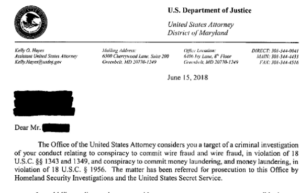
If you have heard rumors that the FBI has been asking questions or if you’ve received a Target Letter, you have run out of time and need legal representation. Listen to my video below, as this was how it started for me.
Unfortunately, worrying won’t help you or change your current events. It didn’t for me.
It’s decision time: do you go to Trial or Plea?
- Trials are expensive and involve hours of discovery, not counting the trial itself. At hundreds to thousands of dollars per hour – understand that by the time you learn that the DOJ is knocking at your door, their Case is Mostly Complete, and their Conviction Rate is 98%, so you may want to ask your attorney; how many cases like yours they have taken to trial (or appeal) and won.
- Unfortunately, our justice system is far from perfect, and just feeling that you are innocent (and You May BE INNOCENT) may not be enough. That said – if your case is strong – go to trial. But all is not lost, even if you lose.
- Do not alienate to judge, because even with a guilty verdict, you can regroup, and prepare for a successful Presentence Interview.
- A Plea will save you money in legal bills and possibly help at sentencing because the prosecutor won’t have to spend as much time preparing for a trial. Whether you elect to go to Trial or Plea, what you do next will impact your future.
- Preparation for your Presentence Interview needs to include your Story (Autobiography or Your Personal Narrative), a
 Release Plan, and your Allocution. Should you feel that you may be too nervous to speak in court, (your conversation with your Judge), you can provide your Allocution in written or Video format before your PSI. You are also allowed to bring written notes into court with you. Why? Because judges have been interviewed, and they want to hear from you, the defendant, for many reasons,
Release Plan, and your Allocution. Should you feel that you may be too nervous to speak in court, (your conversation with your Judge), you can provide your Allocution in written or Video format before your PSI. You are also allowed to bring written notes into court with you. Why? Because judges have been interviewed, and they want to hear from you, the defendant, for many reasons,
1) They want to believe you’ve Accepted Responsibility for your actions.
2) They want to see that you have Remorse for the Pain you have inflicted on your Victims.
3) They understand crimes do not happen in a vacuum – what happened in your life that caused you to break the law?
4) What is your plan (Your Release Plan) not to return to their courtroom?
5) Were there other ramifications, such as losing your professional license to practice in a career you love?
6) Provided in written form is good, and accompanied by a short video is another great option that could be cheaply done on a smartphone.
7) Have you always provided community service or volunteered in your community – if so, talk about it and ask for Character letters for verification.
Attorneys know the law, but the nuances of navigating through Federal Prison aren’t part of a traditional legal defense. Are You Ready To Advocate For Yourself and Participate in Your Defense?
Call 240.888.7778 for a personal one-on-one call
to discuss your current issue or that of a loved one.-Marc Blatstein
Sentencing mitigation requires a unique set of knowledge and skills that are of interest to both a) those facing prison and b) those who are responsible for preparing defendants to reenter society as law-abiding citizens.
PREPARATION AND KNOWLEDGE: THE 5 STEPS YOU NEED TO IMPLEMENT
1. YOUR DEFENSE
2. YOUR PRESENTENCE INTERVIEW (PSI): PHYSICIAN-ASSISTED
3. YOUR NARRATIVE AND ALLOCUTION
4. YOUR SENTENCING HEARING
5. YOUR RELEASE PLAN
1. YOUR DEFENSE
- Finding an experienced criminal defense lawyer is crucial when dealing with federal charges. The Department of Justice has a high conviction rate, so deciding on going to trial or plea should be carefully considered with your attorney. If the decision is “Trial,” ask your attorney how many cases like yours they have taken to trial – and won. Remember, the DOJ has a 98% Conviction Rate, meaning they usually don’t lose.
- PROMISES AND GUARANTEES – DON’T LISTEN. Even if you have the Best Legal Team, and they tell you they have worked out an agreement with your Prosecutor for a Lessor Sentence Than The Guidelines, Be Grateful, and get it in writing.
* Remember, Now Is Not The Time To Relax As Your Judge has Not Guaranteed, 100%, Reducing Your Sentence; Before Your Sentencing Hearing. Continue Your Preparation until the very end. - Properly preparing for your Presentence Interview is your next step and is critical for your future. Have you thought about what it entails?
2. YOUR PRESENTENCE INTERVIEW (PSI): PHYSICIAN-ASSISTED
a) YOUR PRESENTENCE INTERVIEW (PSI) – IT IS THAT IMPORTANT: Here, all your Personal Identification and Biographical Background information (proofread for accuracy) is provided to your Probation Officer. It is recommended that you include Your Personal NARRATIVE and Release Plan. WHY?
YOUR NARRATIVE INCLUDED IN YOUR PRESENTENCE REPORT – WILL HELP HUMANIZE YOU TO YOUR JUDGE.
-
- Everything should be provided to your Probation Officer 1-2 weeks before your Interview. This will result in a less stressful interview day as the officer already knows your background and can take the time to get to know you personally. Asking any remaining questions they may have, they may come away with a more positive view of who you are.
- The Probation Officer next drafts your OFFICIAL PRESENTENCE REPORT.
b) THE PRESENTENCE REPORT CONTROLS YOUR FUTURE – MEDICAL CARE:
(1) MEDICATION AVAILABILITY: This is important, and attention should be paid to the BOP Generic Drug List (Formulary) for availability as it is online – because this is All There Is. After surrendering, you do not want to learn your medications are different or unavailable. Non-Formulary or Not Available medications must be addressed with your physician before your Presentence Interview, and should the need arise, these issues should be addressed and solved before your interview date.
(2) MEDICAL: This, too, is important. Why? A recent article noted: (1) 1 IN 4 INMATE DEATHS HAPPENED IN THE SAME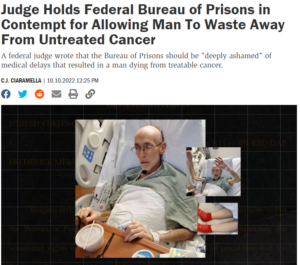 PRISON. Being proactive includes providing a comprehensive medical history long before the Presentence Interview, and you set foot in prison. If you need another excuse to act, (2) October 10, 2022, Judge Holds Federal Bureau of Prisons in Contempt for Allowing Man To Waste Away From Untreated Cancer.
PRISON. Being proactive includes providing a comprehensive medical history long before the Presentence Interview, and you set foot in prison. If you need another excuse to act, (2) October 10, 2022, Judge Holds Federal Bureau of Prisons in Contempt for Allowing Man To Waste Away From Untreated Cancer.
-
- When providing medical care to individuals with unique medical conditions in the Bureau of Prisons (BOP), it is crucial to have your comprehensive medical history prepared and documented before your Interview date, including all medical records.
- This includes reports of surgeries (including pathology reports), diagnostic X-rays, CT, MRI, ultrasounds, EEGs, EKGs, and PET scans (Reports and tests on CD or Flash Drives). All recent blood tests, prescriptions (Drugs and Medical Devices), hospital records, and treatment plans from their treating physician.
This provides you with the ‘best chances’ of getting appropriate care; it is essential to gather all relevant contact information for your current treating physicians, including their names, phone numbers, email, and addresses.
-
- Preparing thoroughly for The Presentence Interview is advisable, especially if any concerns about medical care come from the patient, their attorney, or the treating physician. Doing this in advance makes it possible to plan strategically and ensure the patient/defendant is in the best position to receive the necessary care during their time in the BOP. This is urgently recommended in an age where staffing shortages in all areas exist, extending into medical providers in The BOP Federal Medical Centers.
- I keep adding: No Guarantees – because there are none regarding all aspects of your life once incarcerated. Your best defense is being prepared before and for your Presentence Interview, which includes appointing someone you trust with Power of Attorney. Should you discover that the BOP is not, or cannot provide, the medical care you need, it’s time to involve the court, your attorney, and those attorneys representing the BOP, per their policy statement (#9). If there are concerns before your Interview – begin that process today.
- Why? If you ever need a second opinion while in prison, this could take up to 36 months (or more) if this is even allowed. Second, the Clinical Director of your facility is not required to follow the Specialist’s Recommendations regarding your medical care. Having your Past Medical History included could make the difference. Again, there are no guarantees, but the last option is The Administrative Remedy Process to fall back on.
(3) SENTENCING: This is your first opportunity to meet and speak with your Judge. By this point, the Judge already knows all about you from your INDICTMENT and likely has a sentence in mind. Your only hope of changing their mind is by helping your Judge understand Who You Are – and this can be done by writing your NARRATIVE and RELEASE PLAN and including them in your Presentence Report, which is now under seal.
Including Your NARRATIVE, Personal Identification, and Biographical Background information to your Probation Officer 1-2 weeks before your Presentence Interview, will help prepare you for your ALLOCUTION.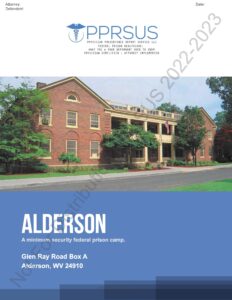
c) MAKING YOUR BOP PLACEMENT REQUEST is a 3-step simple process. To assist you in presenting a strong placement request to the court, please download our sample BOP (Bureau of Prisons) Placement Request Packet. We include programs specifically designed to support the successful placement and rehabilitation of the defendant. By providing this information to the court, you can demonstrate a clear plan for your client’s rehabilitation and increase the likelihood of a favorable outcome. 👉 FPC Alderson.
d) AS A LICENSED PROVIDER, I have 30+ years of personal experience in healthcare, along with how medical care is delivered in prison due to my felony conviction in 2006 when I was incarcerated. With the support of colleagues, my medical license was reinstated in 2010, and several years later, I transitioned from patient care, taking what I have learned to provide Preparation and Knowledge to those facing the reality of federal prison.
-
- I want to ease your concerns and answer all of the questions you and your loved ones have as you go through this life-altering event together. With Preparation and the Knowledge that prison is temporary, you will be best positioned, knowing what to expect when entering and the work you’ll need to do to help expedite your release. At the same time, it’s important to remember that the BOP holds the final decision-making power in this process. Therefore, neither I nor any attorney, consultant, or mitigation expert can guarantee any specific outcome.
3. YOUR NARRATIVE AND ALLOCUTION
Navigating through Federal Prison is not usually part of a traditional legal defense. This requires a unique set of knowledge and skills after a guilty verdict or plea and is of interest to your STAKEHOLDERS. Specifically, the NARRATIVE, ALLOCUTION, and RELEASE PLAN are of interest to your judge and the other STAKEHOLDERS you haven’t yet met. Are you prepared?
4. YOUR SENTENCING HEARING
In addition to your legal defense, are you prepared to meet your Judge, and if so, what are you planning to say? Have you read your attorney’s Sentencing Memorandum? Is your NARRATIVE and just a few Character Letters attached? Are you and your legal team prepared to make the 3-point BOP Placement Request?
5. YOUR RELEASE PLAN
Your plans to reenter your life take on serious meaning the closer you get to your release date. What was your plan, if any? Can you retire as you’re financially set for your remaining years, or do you have to co-parent or care for a family member? Do you have a plan once released, to ease yourself back into the workforce? Unfortunately, most had no plan, and that can be a humbling experience.
This is where the idea of Creating a Release Plan comes from, and though it starts small before your Presentence Interview – as it’s put to paper, it evolves. Mine looked more like a drunken sailor when I started; I was taking daily notes in Pensacola Camp, thinking about this type of work – but mostly thinking about my appeal (silly as the majority fail) and my wondering if I would ever practice again. I never considered arriving at my court date only to have my appeal denied and then be resentenced – I just assumed that the judge would say yes or no. Who Knew?
This is a longer story; my license to practice was reinstated in 2010, and for the rest, call me.
Contact me if you need recommendations for attorneys who practice Federal Criminal Defense and have experience in Federal Court. These should be attorneys with experience in cases like yours and empathy for your stress.
This video is for you. If you received a Target letter invitation to speak to a Grand Jury – get Legal Representation first. For a federal crime, it is best to have an attorney who practices federal criminal defense, having had cases similar to yours, and practices in federal court. It sounds obvious, except for those unfortunate few who just wing it.
Your Judge Sees a Lot of Defendants – How Are ‘You’ Different?
Your Judge Already Knows
The DOJ wants you in Jail.
The Prosecutor wants to convict you.
Your Attorney is paid to keep you out of prison.
Judges Also Know That Crimes Aren’t Committed In A Vacuum.
This is Your Opportunity to Help Your Judge Understand Who You Are: Allocutions Are Not Meaningless
Federal Judge Mark Bennett is among many judges who agree with 👉 incorporating your Personal Narrative into your Presentence Report. This will enable the court to understand your background and the factors that led you to commit the offense – without making excuses for your actions.
It is crucial to take responsibility for your actions, express genuine regret for the harm caused to your victims, and speak humbly from the heart during your court appearance. To help your judge understand who you are, refer to the Personal Narrative in your Presentence Report. I recommend watching my video (below) for further guidance on communicating your story and showing remorse effectively.
Are You Prepared Today – To Speak To Your Judge?
Speaking from the heart could influence the courts and impact your sentence – for the BETTER. On the other hand, if you are not prepared, it may be best not to say anything.
Do You Feel Prepared For Your Presentence Interview? Have You Picked The Right Attorney – For You? Are You Comfortable (Nervous Is OK) To Speak With Your Judge at Sentencing?
Call 240.888.7778 for a personal one-on-one call
to discuss your current issue or that of a loved one.-Marc Blatstein
We are not Attorneys; you need Legal Representation.
No one can guarantee results, as the outcome at the end of the day rests with your attorney, the Judge, and The Federal Bureau of Prisons. Once inside, as in life, some staff will genuinely care about you and their job, while others look at you as a number. The only person who can control Your Reactions and Emotions ⇒ Is You.
Don’t let this be a missed opportunity!
PPRSUS is here to help.
Photo Credit: https://www.instagram.com/ngu.donaldtong/?ref=pexels


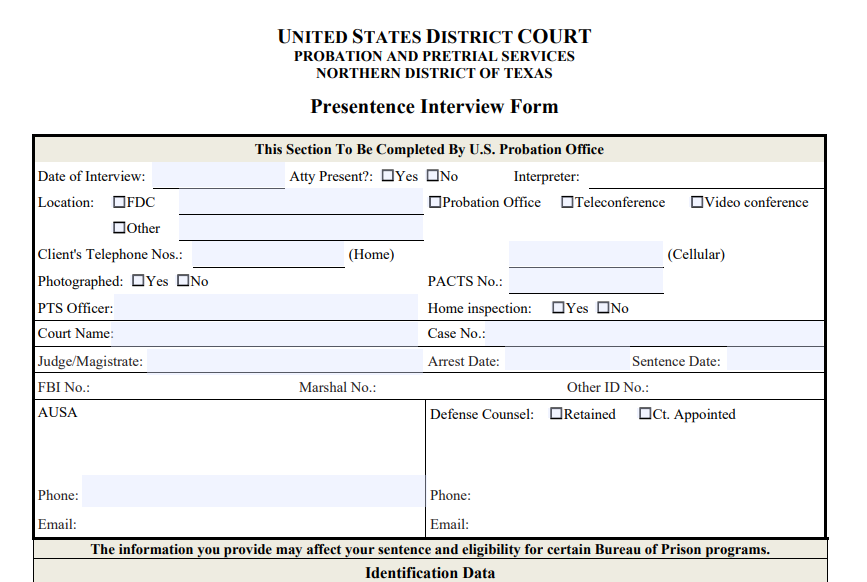
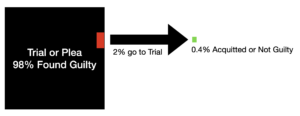


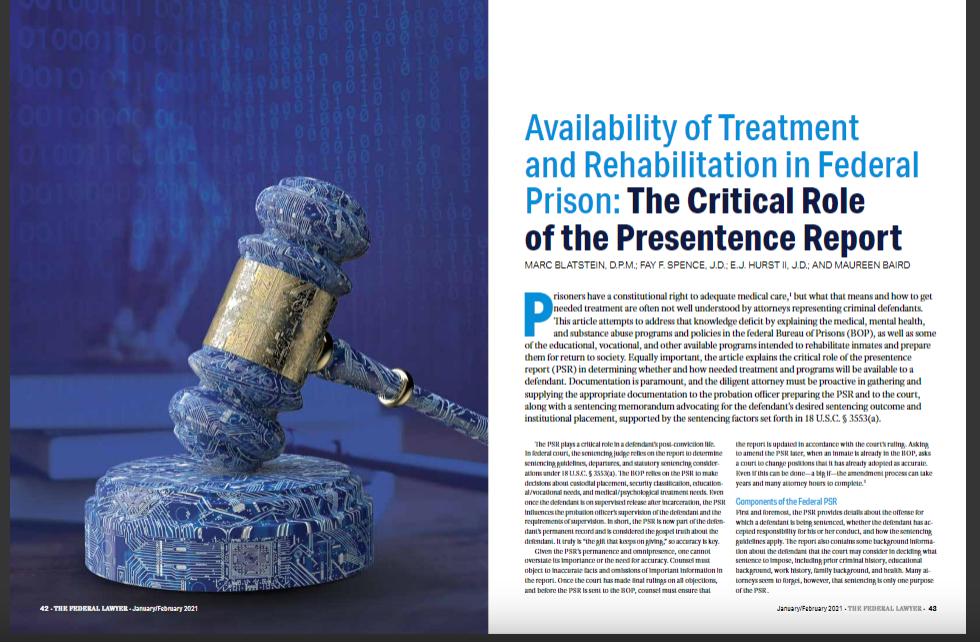
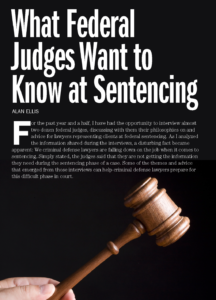 very impressed with lawyers who show legal advocacy in their presentence memorandum ondisputed guideline issues. I appreciate lawyers who give me everything I need well in advance of the hearing.”
very impressed with lawyers who show legal advocacy in their presentence memorandum ondisputed guideline issues. I appreciate lawyers who give me everything I need well in advance of the hearing.”
